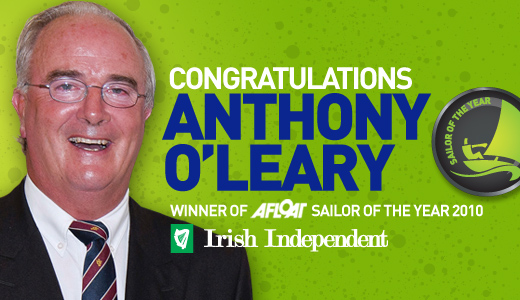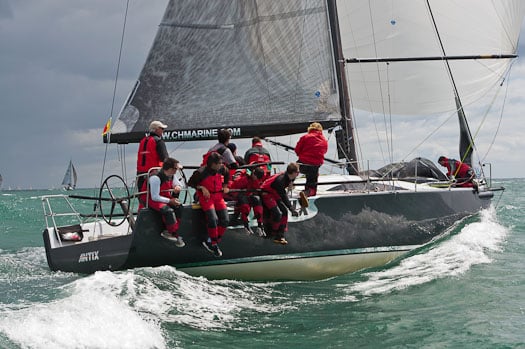Displaying items by tag: year
Outstanding Anthony O'Leary is Worthy Sailor of the Year
Anthony O'Leary of Cork is the Afloat.ie/Irish Independent "Sailor of the Year" in celebration of his outstanding achievements afloat nationally and internationally throughout last season, and to honour his dedication to sailing in all its forms both as a participant and an administrator.

The O'Leary pace afloat and ashore belies his age of 53. During 2010, it was in May that he was "Sailor of the Month" for an already remarkable list of wins with his Ker 39 Antix. Having topped the April Series in Kinsale, he then won the Crosshaven-Dun Laoghaire race overall, went on to win his class and be one of the top points scorers in the ICRA Nationals in Dublin Bay, and then went on to Scotland to win his class overall with a nail biting brace of wins on the final day of the Scottish Series.
To achieve all that before May was out was exceptional, but the O'Leary progress was only beginning. The big picture was to maintain momentum towards the international Commodore's Cup in the Solent in August. Antix was one of the three boat squad, and her skipper was also the team captain in a campaign which was light years away from the glossy efforts which dominated the boom years of Irish affluence.

Anthony O'Leary takes on the waves at the helm of his yacht Antix during Cork week in Cork Harbour. Photo: Bob Bateman
In previous seasons, Ireland had been able to muster enough boats for two or even three teams, yet had never won despite being within inches of success. But this time round, only three boats were game for it, and only one – Rob Davis's Corby 36 Roxy – was new. Yet with Dave Dwyer's ever-keen Mills 39 marinerscove.ie filling the third slot, O'Leary headed a potent force, and he himself sailed with style and inspiring sportsmanship to give Ireland a commanding overall win.
Anthony O'Leary is the personification of Irish sailing at its very best. With the enthusiastic support of his wife Sally, he is father to a family which has logged outstanding sailing success at all levels. Yet he himself is in many ways the quintessential club sailor. He is as happy racing the Autumn series at Crosshaven with a 1720 or the West Cork regattas with a cruiser-racer, as he is competing at the highest levels. He has been among the front runners for the title of Ireland's "Sailor of the Year" several times. And now, as with all his wins, when he does do it, O'Leary does it with style.




























































